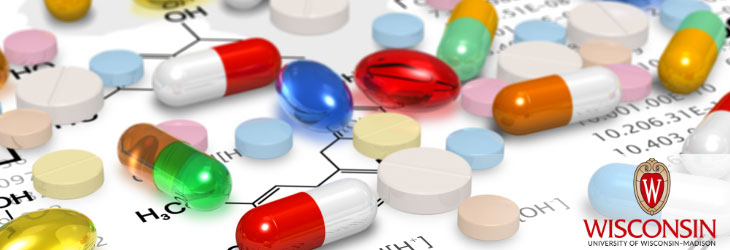Therapeutics & Vaccines

Oligolactic Acid-Paclitaxel and Oligolactic Acid-Docetaxel Prodrugs for Injection
WARF: P160169US03
Inventors: Glen Kwon, Yu Tong (Tony) Tam
The Wisconsin Alumni Research Foundation (WARF) is seeking commercial partners interested in developing oligo-lactic acid (oLA) paclitaxel (PTX) and docetaxel (DTX) prodrugs as next-generation taxanes for injection and cancer treatment. Our oLA-PTX and DTX prodrugs are highly compatible with approved PEG-PLA micelles for injection, increasing loading, enhancing stability and slowing release in vitro. As a result, oLA-PTX and oLA-DTX prodrugs increase taxane plasma exposure versus conventional taxane formulations, lowering toxicity and increasing antitumor efficacy. Repertoire of oLA-prodrugs extends to rapamycin (mTOR inhibitor) and selumitinib (MEK inhibitor) as strategy to increase plasma exposure versus oral formulations to enhance antitumor efficacy.
Overview
- PTX, DTX, rapamycin and selumetinib are potent chemotherapeutic agents useful in the treatment of a variety of cancers. Due to their limited water solubility, PTX and DTX are commonly formulated for parenteral infusion with specialized vehicles that include surfactants, such as Cremophor EL (CrEL), and solvents, such as ethanol. CrEL, for example, is known to induce life-threatening hypersensitivity reactions despite pretreatment with antihistamines and steroids.
- Due to their limited water solubility, clinically approved rapamycin and selumetinib formulations have low oral absorption, limiting plasma and tumor exposure.
- Approved PEG-PLA micelle compositions have been proposed as safe alternative delivery vehicles for poorly water soluble anticancer drugs, e.g., PTX. However, PEG-PLA micelle compositions suffer from low drug loading and poor stability, leading to fast release, widespread biodistribution and low tumor exposure.
The Invention
UW–Madison researchers have developed oligolactic acid prodrugs based on PTX, DTX, rapamycin and selumetinib for PEG-PLA micelles for injection.
- Oligolactic acid acts as a compatibilizer between anticancer drugs and PEG-PLA micelles, resulting in enhanced drug loading, physical stability and controlled release.
- Oligolactic acid prodrugs are stable in PEG-PLA micelles and upon release convert back into parent drug by a combination of “backbiting” and esterase-based hydrolysis rather than by random hydrolysis.
- Oligolactic acid-PTX prodrug injected in PEG-PLA micelles has higher plasma exposure than PTX injected in PEG-PLA micelles at an equivalent dose.
- Oligolactic acid-PTX prodrug injected in PEG-PLA micelles has higher antitumor efficacy than PTX injected in PEG-PLA micelles at an equivalent dose.
- Oligolactic acid-rapamycin prodrug injected in PEG-PLA micelles has higher antitumor efficacy than rapamycin injected in PEG-PLA micelles at an equivalent dose.
Applications
- Breast, lung and prostate cancer
- Novel drug combinations – co-loaded oligolactic acid prodrugs in a PEG-PLA micelle
- Novel combination immunotherapy
Key Benefits
- Superior solubility, lower toxicity and/or enhanced efficacy
- More effective and less toxic than conventional formulations
Stage of Development
- Completion of physicochemical characterization of PEG-PLA micelles containing oligolactic acid prodrugs based on PTX, DTX and rapamycin
- Proof-of-principle of scale-up method for PEG-PLA micelles containing oligolactic acid prodrugs based on PTX, DTX and rapamycin
- Preclinical in vivo data on PEG-PLA micelles containing oligolactic acid prodrugs based on PTX and rapamycin
Additional Information
For More Information About the Inventors
Related Technologies
Publications
- Yu Tong Tam, J. Gao and G. S. Kwon, Oligo(lactic acid)n-paclitaxel prodrug for poly(ethylene glycol)-block-poly(lactic acid) micelles: Loading, release, and back-biting conversion for anticancer activity, J. Am Chem. Soc., 138 (2016) 8674-8677.
- Glen S. Kwon, Yu Tong Tam, Oligolactic acid conjugates and micelles with enhanced anticancer activity, U.S. patent 10456477.
- Tam et al. "Poly (ethylene glycol)-block-poly (d, l-lactic acid) micelles containing oligo (lactic acid) 8-paclitaxel prodrug: In Vivo conversion and antitumor efficacy." Journal of Controlled Release 298 (2019) 186-193.
- Yu Tong Tam, Lauren Repp, Zhi-Xiong Ma, John B. Feltenberger and Glen S. Kwon. "Oligo (lactic acid) 8-rapamycin prodrug-loaded poly (ethylene glycol)-block-poly (lactic acid) micelles for injection." Pharmaceutical research 36, no. 5 (2019) 70.
Tech Fields
For current licensing status, please contact Rafael Diaz at [javascript protected email address] or 608-960-9847